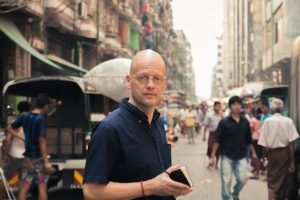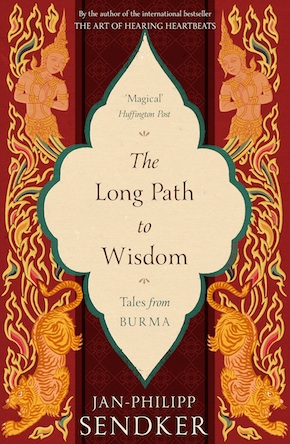Unlocking vanishing voices
by Mika Provata-CarloneTravelling through Burma (Myanmar) in the mid-1990s, Jan-Philipp Sendker, a young German journalist for Stern and other publications, is given as a parting gift a tattered old book, carefully restored by a local bookseller who has spent many days sticking small pieces of paper over its hole-ridden pages, and retracing by hand the obliterated printed letters on these makeshift patches. Lacunae of memory and of meaning are thus repaired and reconciled, painstakingly retrieved and given what one hopes may be a new lease of life. By offering this book to a curious peregrinating stranger, the local bookseller extends not only a gesture of friendship and perhaps of kinship, but also a plea for the transmission of a legacy, for the unlocking of a voice and the retelling of a story, for a new language, perhaps, to speak a very old history and wisdom.
The book that thus finds its way into Sendker’s hands is called The Soul of a People; originally published in 1902, it is the work of the now all but forgotten Harold Fielding-Hall, a colonial administrator and a prolific and evocative writer on Burma, Buddhism, and Eastern spirituality. It was a book that inspired Olive Schreiner, another singularly idiosyncratic writer searching for the souls and voices of a muted humanity in danger of perdition, to exclaim that “it has been to me like rain falling on a dry thirsty ground to read it.”
Sendker too admits himself to be thirsty for that purer state of existence and for a world untainted by civilisation, its discontents and especially its sense of materialistic contentment. Burma/Myanmar (he uses the terms interchangeably) is for him a Shangri-La realm, a fecund promised land of retrieval, restoration, rebirth and return. Similar to 19th- and early 20th-century ethnographers and ethnologists, he seeks to walk with the natives, to approximate their gaze, to speak their vernacular in order to re-enact and salvage their gestures, their ritual attachment and engagement with life, their cosmos and reality, both phenomenological and transcendental. Like Grieg, Smetana, Dvorak, Mussorgsky and Bartok before him, he is enchanted by the throbbing tactility, the undaunted and unadulterated immediacy of the sounds, images and tales of the Volk, the simple, uneducated, untamed and unprocessed people of the land. Like Thomas Percy or Milman Parry and Albert Lord, Malinowski and Claude Lévi-Strauss, James Frazer or Clifford Geertz, Sendker sees the archetypal emotions and instincts of a people, the subliminal everyday mind of the ordinary man, as crucial to cultural understanding – and especially to cultural survival. And like Aesop, Lafontaine, the Brothers Grimm, Andersen, Tolstoy or Blaise Cendrars, he is eager to tap into this kind of bucolic utopia of tales and legends, of originary moments of communal feeling and expression, of primary wisdom and enlightenment, for the sake of its beauty and simplicity, for its irresistible atavism and its unyielding gaze that faces frontally both human cruelty and the gentlest, most fragile recesses of the human psyche.
Sendker’s collection of folk tales, legends and parables takes us on a journey to a lost paradise of the imagination and to a world of real lives whose substance and existence is but a twilight glimmer of all that it was.”
Sendker follows passionately the Parry-Lord thesis: orality guarantees authenticity and reality, an unperverted, virginal state of being and becoming. The lower the level of formal literacy, the greater the purity of its primary medium of self-manifestation that is its oral tradition, and therefore also the genuineness of its cultural expression and truth. For a Westerner disenchanted by the progress of globalised uniformity, by the simulacra of assimilation and universality, the discovery of a new world untouched by our influence inspires true and unmitigated thrill and fascination. Delicately balanced between cultural ethnography and poetic vision, Sendker’s collection of folk tales, legends and parables takes us on a journey to a lost paradise of the imagination and to a world of real lives whose substance and existence is but a twilight glimmer of all that it was.
Sendker is an intrepid (and idealistic) student of human nature, its customs and mores. The story of his long relationship to Burma has all the lyricism of a Romantic chronicler of the Levant, as well as the careful caution of the cultural scientist: he is wary not to impose a non-indigenous perspective, alert to the pitfalls of a disingenuous exhortation of primitivism or folkloric kitsch. His is an evocative, uplifting total immersion into a culture that holds for him an infinite allure with its mysticism, its wisdom, its ambiguity, its complex uncomplicatedness. Meticulously contextualised, Sendker’s experience reflects a current resistance to mass-applied principles, master narratives, canonised experiences and certainly a rebuttal of political correctness and its demands for disorientalism at all costs. The Long Path to Wisdom is a love poem to a country that is not one’s own, an unapologetically German point of view of the most intimate and unpoliticised aspects of the Burmese/Myanmar heart and soul.
Unlike others before him who used local lore to create a new fictional vernacular – a culturally sophisticated, literary vulgate – Sendker erases himself as an author and positions himself in his text as a transcriber of stories already told, as a scribe of orality, and perhaps one may dare say, as the custodian and conservationist of a tradition. The layers of the resulting palimpsest are numerous: we are told of a team of story collectors, of translators transmitting the stories presumably first into English and then into German, of a final editorial resculpturing of the texts, and, for the present edition, one more semantic intervention, as the German edition, whose original title is The Secret of the Old Monk: Legends and Fables from Burma, is retranslated into English. These several reincarnations do leave their traces on the stories and their diction, and particularly critical readers may experience some of the ire that is currently directed against the re-edition in France of Blaise Cendrar’s Petits Contes Nègres pour les Enfants Blancs (1929). Yet here too one ought to bear in mind the motive behind Cendrar’s project: his collection was a celebration of a culture in the furthest margins of dejection, which in the 1920s found itself unexpectedly, beyond all hope, at the centre of cultural influence and transformation. Sendker too urges us, poor culturally faceless children that we are, to seek the depth and richness of a culture still engaged with its identity and uniqueness, its distinct qualities, even its horrors and dark corners.
The stories selected by Sendker range from parables on gratitude and ingratitude, to more substantial tales on the impossible union of incompatible opposites, or the futile hope that the solution to a dire crisis lies in restoring things back to the moment before it all began – a reversal of time, human action, and in Burmese terms karma and destiny. They deal with truthfulness and deceit, bravery and spinelessness, the pursuit of happiness and the simple life. They are cheeky, elegiac, cautionary, troubling or absurd. They fuse love with cruelty, wisdom with droll stupidity, and they force readers to stop and ponder the value and false brilliance of pure reason over the quiet triumph of common sense. There are glimpses of Hansel and Gretel, Aesop’s Fables, Lafontaine’s lilting tales.
The tales of old wives and of very wise old men provide shrewd analyses of the relationships in small communities, of disastrous human failings and the unquenchable hopefulness of a persevering virtue and innocence.”
Above all, they require a total suspension of disbelief, and they evince a hefty, punchy dose of irony and of meanings underlying and often belying the presumed semantic surface. They offer a humorous view of life coupled with a defiance against life’s pragmatic cruelty, they are a celebration of life’s arbitrariness and even of human mortality and our limitations, of futility and kindness, and the inevitability of misfortune, adversity and everyday blissfulness. They are contradictory and subversive, the tales of old wives and of very wise old men, and they provide shrewd analyses of the relationships in small communities, of disastrous human failings and the unquenchable hopefulness of a persevering virtue and innocence.
Perhaps their ultimate revelation lies in the following three maxims: “only one who travels will reach his destination; only one who asks will receive an answer; only one who sleeps less will get more out of life.” The stories in The Long Path to Wisdom offer as many layers of discovery and enchantment as one may wish to acknowledge and perceive; they can be read as pleasing curios, as echoes from a time beyond memory or time, as precious artefacts in need of preservation, as vital enunciations that must not be silenced, as parables for deeper contemplation. We are offered an initiatory introduction and a reflective epilogue that are both powerfully redolent and open-ended, suggesting perhaps that the long path to wisdom is still to be savoured, there for the undertaking for as long as we may be tempted by stories, voices and human dreams that bear the precious burden of reality and the true weight of a community and its history.

Author portrait © Frank Suffert
Jan-Philipp Sendker was the American correspondent for Stern from 1990 to 1995, and its Asian correspondent from 1995 to 1999. His first novel The Art of Hearing Heartbeats was an international bestseller, and he’s the author of A Well-Tempered Heart, and the China trilogy Whispering Shadows, Dragon Games and At the Other End of the Night. He lives in Berlin with his family. The Long Path to Wisdom, translated by Lisa Liesener and Kevin Wiliarty, is published in paperback and eBook by Polygon in the UK and by Other Press in the US.
Read more
janphilippsendker.de
Facebook: Jan-Philipp Sendker
Mika Provata-Carlone is an independent scholar, translator, editor and illustrator, and a contributing editor to Bookanista. She has a doctorate from Princeton University and lives and works in London.


